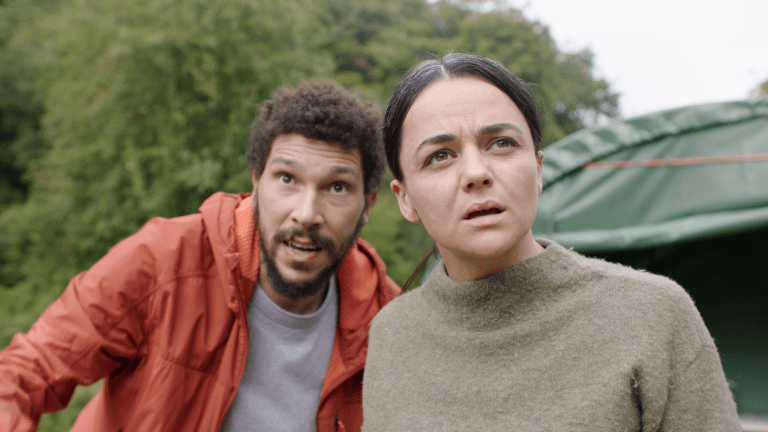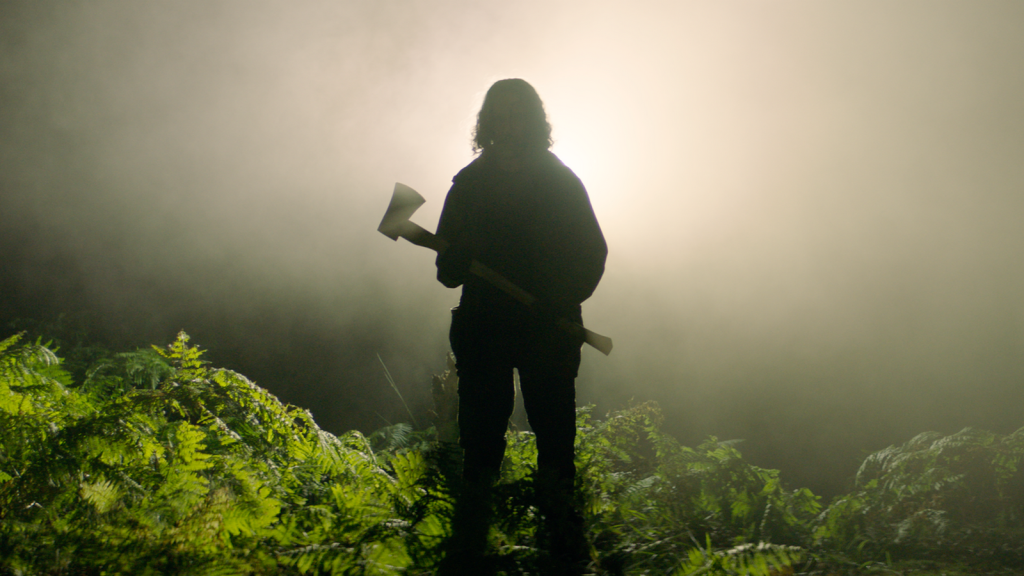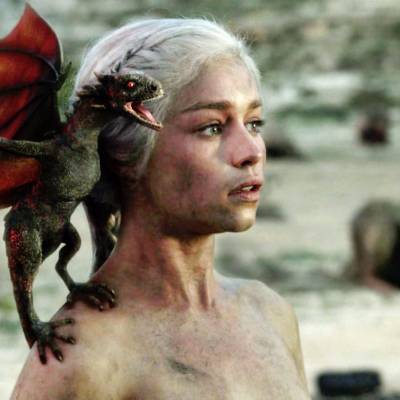In the Earth: Ben Wheatley Explains How COVID Changed Horror Movies
Ben Wheatley, the director of Rebecca and Free Fire, turned a pandemic lockdown into an opportunity to make his excellent new horror film In The Earth.

British filmmaker Ben Wheatley had his Rebecca remake in the can and was in pre-production on the sequel to 2018’s Tomb Raider reboot (which he is now no longer attached to) when the coronavirus began tearing its path around the globe. It would soon shut down almost all film production in addition to all other aspects of society.
At first stunned and frightened like everyone else, Wheatley — whose iconoclastic filmography also includes the nerve-rattling Kill List, the psychedelic period piece A Field in England, and the satirical crime thriller Free Fire — did what all creative people always do: channeled what was happening into a completely new idea for a movie.
One year later, Wheatley is out with In The Earth, his first horror movie since Field and, after Rebecca, a return to his low-budget roots. Set during the aftermath of an unspecified pandemic, In The Earth follows a scientist named Martin (Joel Fry) and a park ranger named Alma (Ellora Torchia) who head deep into a remote forest to check on a researcher named Dr. Wendle (Hayley Squires).
The journey turns nightmarish as they are menaced by both a mysterious presence and Wendle’s ex-husband Zach (Reece Shearsmith), who has a bizarre agenda all his own. In The Earth touches on themes that Wheatley has examined before, including the unknowable power of nature and human beings’ penchant for obsession, cruelty, and shocking violence, all within an eerie context we know too well from the horror show that was 2020.
Wheatley remains one of the most distinctive and surprising filmmakers on the scene, zigzagging from one unusual project to another, and in fact when Den of Geek caught up with him to discuss In The Earth, he was at work on another big-budget Hollywood sequel, this time to 2018’s hit monster movie, The Meg.
Den of Geek: Let’s talk about the inspiration for this, which has clearly been our current predicament for the last year or so.
Ben Wheatley: The whole thing from writing it to the cinema is exactly a year. I started writing this in the first week of lockdown in the UK, which would have been about the First or Second of March, something like that. I wrote it as a way of just trying to process what was happening but also just to try to feel optimistic about the future, so there was something to aim for going forward. Then it started to develop into something else, and as I was writing it, I started to see all sorts of different patterns inside it.
I started talking to Andy Starke, the producer, and we realized that we might be able to make it. If we timed it right, we’d be able to get it done. Maybe there was an opportunity just as the first wave stopped, before the big movies came back in, or big television came back in and sucked all the crews and actors away. Plus everyone was basically sitting on their hands, having not worked for three or four months. So that was the beginning of it, a slightly cheeky plan to get something done.
Also, every project I had was folded at that point in March. I almost felt like I was never going to work again, for a split second. It’s like, “Oh my god,” which I’m sure was a common worry for everybody. So it started to come out of that. That was the beginning of it.
Was it difficult to write something in a way that wouldn’t also instantly feel dated six months later?
I don’t think that’s a worry so much. It’s almost like I’m more excited about making something that’s in the moment. My film Happy New Year, Colin Burstead has a similar set of issues where it was made about a political situation, it was around Brexit, and all those things are important to it. Kill List was as well, and Sightseers to a slightly lesser degree, but Kill List was a very particular moment in British history and world history, as well. So I’m not worried about that stuff.
In a way, the idea of things becoming dated — I watch a lot of movies from the ’60s and ’70s, it never bothers me about the political situation being different from now. I think dated is more like attitudes are dated, and that can be unfortunate when you watch something and go, “Oh god, did people really think like that then? Things have moved on slightly from that.” But also, when I was writing this, I was thinking, “This is not going to go away. I don’t think it’s going to go away for years, is it?”
There was something about watching TV and watching movies and going, “All these films feel like they’re so in the past now.” The stuff that was released after the lockdown, the concerns of these characters would be completely different now, in any contemporary film. Anything that was period was all right, but anything that was contemporary, you just went, “This feels weird.” Even just watching Tenet and going, “Look at all these people at a concert.” It felt weird. I was like, “This feels like from another time,” and I think that was part of the thing that spurred me forward, going, “I want to make something that’s in this moment.”
Your previous film was Rebecca. Was this in a sense going 180 degrees from that? Rebecca was made for a large company, with big stars and a certain amount of gloss. This is a return to your roots in a way.
All the films are like that though, they’re all very different from each other. But if there hadn’t been COVID, I’d have done Tomb Raider 2 next. And then you could have the same conversation there as well. That’s very different from Rebecca, but it’s a different type of different. So I think that that’s always the hope, is that they’re different, because you don’t want to end up making the same thing again and again.
I’ve been lucky enough to be able to do those kinds of lower budget films. I think that films only hae a problem with their budget if you’re trying to make a high budget film for a low budget, or the wrong budget. But if you know what the budget is and it’s integrated into the script, it’s happy days, and it’s always good fun. There was no particular stress on In The Earth because of the money, because it was written specifically for that money, so it was never going to be anything else.
Talk about the logistics of making the film. You shot it in 15 days? How did you deal with the protocols of shooting during a pandemic?
The protocol stuff was a worry. We were the first film back that was a new production. Everything else filming around that time was big stuff like The Batman and Mission Impossible, and they were just restarting [after pausing filming]. So we had the eyes of the UK production industry on us, because if we screwed it and had to shut down straight away that would be a massive roll-on effect to everybody else. So we were very nervous about it. But, more importantly, we were nervous about the crew, because we didn’t want to risk anybody, didn’t want to get anybody sick. So a lot of time was spent thinking about it.
But then, in the end, the actual filming of it wasn’t too bad. There was a lot of money spent on PPE [personal protective equipment], sanitizing, masks, and things. But the pace of filming was exactly the same as all the other movies. Fifteen days, which is about the right amount of time for a genre horror movie, I think. A lot of it had been inspired by seeing schedules for Halloween, which I think was 20 days or something like that. It’s pretty lean and mean. We looked at that and went, “Wow, this is it. They’ve got a similar amount [of time].” I think the budget was similar to the budget that we had as well, the Halloween budget, adjusted for inflation. If you can’t make something good with this amount of money, then you’re doing it wrong. So that was inspiring as much as anything.
This connects to a film like A Field in England, because they’re both about something inexplicable in nature having an effect on human beings. Are those ideas that percolate in your head a lot when you’re writing a film like this?
I think Field is a horror film, [but it depends] how you define horror. My definition is reasonably broad, I think, for horror. Anything that is trying to make you uncomfortable and afraid, I think, is horror. But then, with my own definition, that would include musicals. The structure for In The Earth, there’s an unknowable something that’s living out in the woods, and various factions are trying to communicate with it, to varying levels of success. It’s a thing that is alien and can’t be communicated with in a traditional human way, but they’re trying to find a way through it.
I kept thinking about the thing that makes us different from other creatures, which is narrative and how narrative is our main technology, and putting ourselves in the middle of stories and trying to make stories around everything to make them make sense to us. That felt to me like that was Zach’s story, the story of a narrative. It was that he was desperately trying to make sense of these bits of information, but getting it hideously wrong. It’s the things around the creature which are the most dangerous, not necessarily the creature itself.
I read that Clint Mansell actually wrote the score before you started shooting, so you were able to play some of it on set to help set the mood?
Yeah, totally. It was one of the weird bits of luck that the whole COVID situation had brought, because I got to spend a lot more time on the score than I would have done for a film this size under normal circumstances. So Clint and I were talking about it while I was writing the script, and then those demos were bouncing backwards and forwards all during the summer.
The same goes for Nick Gillespie, the director of photography. We did a lot of testing, though we didn’t even see each other until two days before we shot the film because we’d been isolating. There was a lot of work that happened, because the pace of everything had slowed right down to a snail’s pace. You could drill into a lot of things that you never would do under normal circumstances.

The violence and the gore in your movies always strikes me as visceral, fairly abrupt, and almost matter-of-fact. Which I think makes it more horrifying. Is that something you aim for?
Yeah. That’s the reality of when you injure yourself. That feeling of, “Oh,” and you look at it and it doesn’t quite look right, and you’re like, “Oh no.” But it’s also the rhythm of using prosthetics and using wounds and stuff, it’s a similar rhythm to the way comedy works as well, with setup and punchline, and then response. They’re keys you’re basically playing within the scenes that are very specific and planned. Certainly the stuff in In The Earth, the scene in the tent, what I wanted to do is slow time down. Really slow it down so people were just like, “Oh, god.” They know they’re going to see something, and they know it’s going to be bad, but they know the situation can never stop. It’s like a proper nightmare.
There are things in the film that are graphic, but it’s a lot less graphic than many, many other films. It’s tonal — it’s not making light of the stuff. It’s going, “This is serious,” as opposed to just being throwaway. Not that there’s anything wrong with that, it’s a whole different type of agenda. But with this, I wanted to raise the pulse of the viewer and make them sweat.
Is The Meg 2 next in your sights? Are you actively working on that now?
Yeah, I’m storyboarding at the moment on Meg 2. It’s been going on for four months, five months of boarding. It’s my happy place. I love storyboarding. I’m cutting storyboards and watching animatics, and slowly constructing the movie. It’s really exciting. It’s just action on a massive, massive scale.
Did you have a hand in the script?
No, the script is by the Hoeber brothers who wrote the first script, so it’s kind of a continuation on from that story.
Who is coming back from the first movie?
I don’t think I can say at the moment what’s going on, the ins and outs of it. But guaranteed, there will be a Megalodon… maybe more than one.
Are you still trying to get Freak Shift [Wheatley’s long-delayed underground monster movie] off the ground?
It bounces around. That’s the film that never goes away. I was thinking about it, I remember being in LA trying to get a meeting with Charlize Theron and then being told, “Oh no, she can’t do the meeting, she’s flying off to Africa to do Mad Max.” I was like, “Oh.” When we had that script originally it was quite a bold gender thing with a female hero. Now it’s 10 years later and it’s quite straightforward, which is good, but at the time it was quite radical. But hopefully one day.
How far did you get on Tomb Raider 2?
We were storyboarding and we were pretty close. We delivered the script and everything. Then it was almost that week where we went into the lockdown, and it was just like, “Oh, it’s not going to happen.”
In The Earth is in theaters now.


